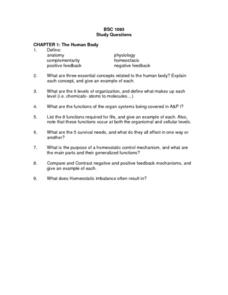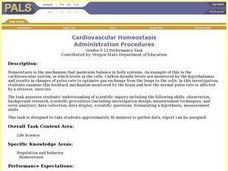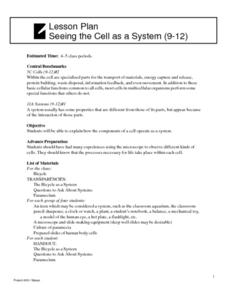Serendip
Homeostasis, Negative Feedback, and Positive Feedback
So many bodily activities depend on homeostasis! Give learners a solid background to understand the basic process of the human body. Scholars first examine negative feedback loops contributing to body temperature regulation and then a...
Curated OER
The Human Body Study Questions
In this human body study question worksheet, pupils define 6 words associated with the human body. They answer 8 short answer questions about the organization and function of the organ systems and organization structure of the human body.
University of Minnesota
Homeostasis of Thermoregulation
Whether you're battling the flu or trying to warm up on a chilly day, your body's ability to react to temperature change is fascinating! Anatomy scholars discover the fantastic feedback loops that control body temperature in a rigorous...
University of Minnesota
Virtual Neurons
It's electric! Young anatomists use Virtual Neurons software to build, control, and analyze complex nerve circuits within the body. Colorful and packed with content, class members enjoy interacting with the nervous system...
University of Minnesota
Mirroring Emotions
Do you ever give your class the "teacher look"? Without saying a word, they become silent and engaged (hopefully). How do they know what you're thinking? Explore the concept of nonverbal communication and how it relates to our...
University of Minnesota
Dendritic Spines Lab
This is your brain on drugs ... literally! Your neuroscientists-in-training examine the evidence of drug use on the human brain and how neurons change their connectivity when altered by drugs. They then work together to create testing...
University of Minnesota
Sheep Brain Dissection
Bored with frog and earthworm dissections? Had your fill of fetal pigs? Anatomy students will be intrigued by the sheep's brain, and you will be prepared with guiding questions, extension activities, and pictures as they dissect one —...
University of Minnesota
Neurotransmission Model
Don't lose your marbles — you'll need them for a lesson on neurotransmission. Young scholars build a neurotransmission model using marbles, beads, rubber bands, string, and other elements. After studying specific neurotransmitters,...
Curated OER
Compare Human-made Objects with Natural Objects
Students examine and observe how many human-made objects get their basic design from things in nature. They listen to the book "Nature Got There First," compare/contrast hollow bones with drinking straws, bird beaks and tool pliers, and...
Curated OER
Cardiovascular Homeostasis
Students develop and conduct an experiment to answer the question," How does cardiovascular exercise affect the pulse rate?". They record the changes to heart rate during different levels of exercise.
Curated OER
Seeing the Cell as a System
Students explain how the components of a cell operate as a system. Students examine a bicycle and find out if parts were arranged differently, could the system still be carried out. They look at cells as well and see what function they...










